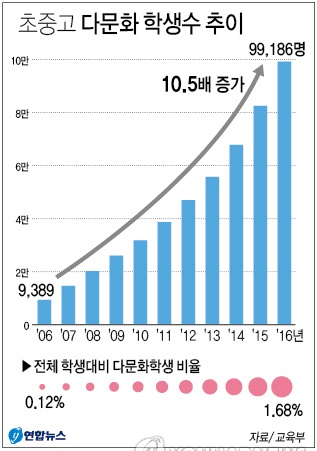Memo #391
By: Léo-Thomas Brylowski – ltbrylowski [at] gmail.com
 A record number of children born from mixed marriages are starting to make their way through South Korea’s public schooling system since the country’s multicultural turn in 2007. These children represented less than 0.5% of all students enrolled in Korean public schools in 2010, but are expected to rise above 2% by the end of 2017 and keep growing every year after. The government has consistently increased its support to students of mixed ethnic background to ensure their successful social and educational integration, but there have been concurrent concerns that these policies are aimed at assimilation rather than the promotion of cultural pluralism and multicultural acceptance within society.
A record number of children born from mixed marriages are starting to make their way through South Korea’s public schooling system since the country’s multicultural turn in 2007. These children represented less than 0.5% of all students enrolled in Korean public schools in 2010, but are expected to rise above 2% by the end of 2017 and keep growing every year after. The government has consistently increased its support to students of mixed ethnic background to ensure their successful social and educational integration, but there have been concurrent concerns that these policies are aimed at assimilation rather than the promotion of cultural pluralism and multicultural acceptance within society.
The Ministry of Education announced on January 12 its multicultural education support plan for 2017. It plans to increase personalized support for multiethnic children by opening more multicultural preschools, providing students at all levels with a greater range of counseling and mentoring services, language classes, academic tutoring and career-oriented opportunities. It also intends to offer more resources to schools located in regions with higher concentrations of multiethnic children so they can expand their multicultural curriculum and offer more favorable learning environments for their students to thrive.
The problem is that most of the policies thus far have only been tailored to answering the needs of multiethnic children specifically, instead of focusing on raising multicultural awareness of all Korean students and instructors across the board. Policymakers have yet to come up with a more comprehensive approach to standardize multicultural education and mainstream it into the national curriculum. The current approach seems to reflect more of a one-way integration model rather than fostering two-way intercultural adaptation, in turn making it much harder for multiculturalism to truly materialize at the broader societal level.
Social inclusion, unlike integration, will require systemic reforms of the education system rather than piecemeal policies, as well as the implementation of mandatory diversity training measures for all educators. Reforms should focus on how to create classroom environments conducive to the formation of new shared values and a new shared Korean identity amongst up-and-coming generations based on the changing socio-cultural reality of the country. Pressure to conform to the dominant culture greatly limits the potential of multiethnic students to contribute to society in meaningful ways and participate in South Korea’s long-term prosperity.
About the Author:
Léo-Thomas Brylowski is an undergraduate student majoring in Asian studies with a focus on Korean language and culture at the University of British Columbia.

As of 2016, the number of multiethnic children enrolled in elementary, middle and high school institutions in South Korea had increased 10.5 fold since 2006. This represents 1.68% of all Korean students, compared with 0.12% ten years earlier. (Source: Yonhap News)

Immigrant mother from Uzbekistan and her little girl appearing on popular talk show “Annyeonghaseyo” on November 28, 2016. Issues surrounding multiculturalism have become an increasingly popular topic on Korean television programs. Since 2015, there has even been an entire reality TV series dedicated to the daily lives of immigrants and multicultural families called “My Neighbor Charles”. (Source: KBS via YouTube)
Links
- Carl A. Grant & Sejung Ham, “Multicultural Education Policy in South Korea: Current Struggles and Hopeful Vision,” Multicultural Education Review, 5, no. 1 (2013): 67-95.
- David Hundt, “Public opinion, social cohesion, and the politics of immigration in South Korea,” Contemporary Politics, 22, no. 4 (2016): 487-504.
- Han, Gil-soo, Nouveau-riche nationalism and multiculturalism in Korea. (New York: Routledge, 2016).
- Kim Kyung-keun & Shim Jae-hwee, “Multicultural attitudes among Korean adults: Relative level, determinants, and tasks ahead,” The Korea Educational Review, 22, no. 1 (2016): 283-310. (Korean). 김경근, 심재휘 「한국인의 다문화적 태도: 상대적 수준, 영향요인 및 과제」『한국교육학연구』 22:1 (2016): 283-310.
- Kim Suhong, “The legal issues of multicultural education for social integration,” The Journal of Law of Education, 28, no. 2 (2015): 27-57. (Korean). 김수홍, 「사회통합을 위한 다문화교육의 법적 과제」『교육법학연구』 28:2 (2015): 27-57.
- Rosa Minhyo Cho, “Exploring the acculturation profiles and adaptation of children in multiethnic families in South Korea,” Asian and Pacific Migration Journal, 25, no. 3, (2016): 245-274.
- Schachner, M.K., Noack, P., Van de Vijver F. J. R., & Eckstein, K., “Cultural Diversity Climate and Psychological Adjustment at School – Equality and Inclusion Versus Cultural Pluralism,” Child Development, 87, no. 4, (2016): 1175-1191.
- Shawn Shen, “The bibimbap migration theory? Challenges of Korea’s multicultural mix and social integration development,” Journal of international migration and integration (2016).
Related Memos:
See our other memos on South Korea.